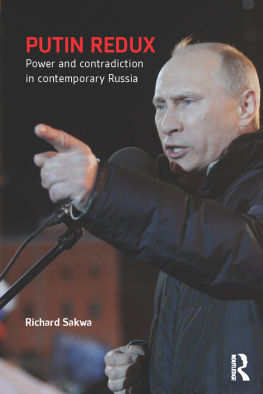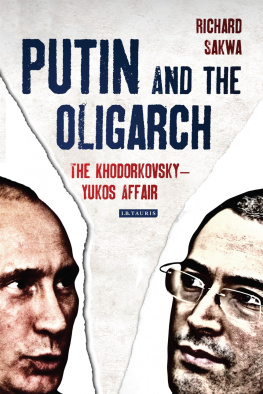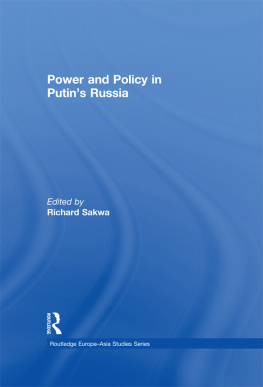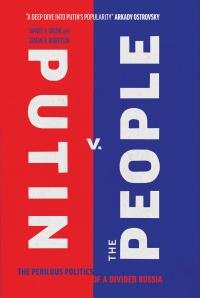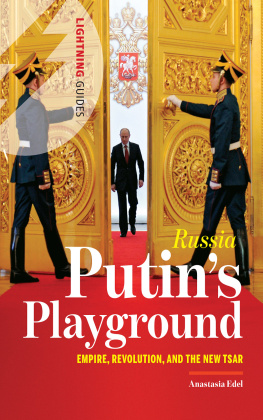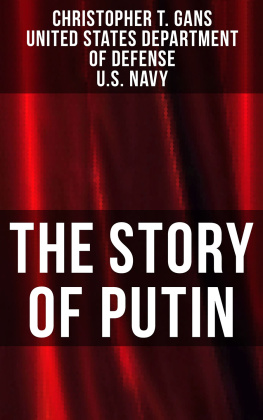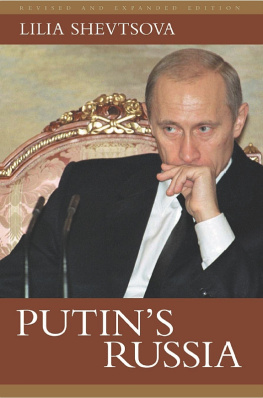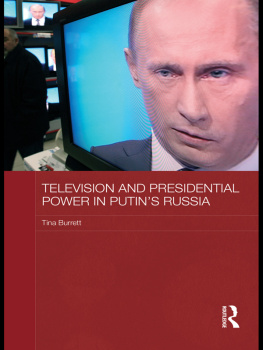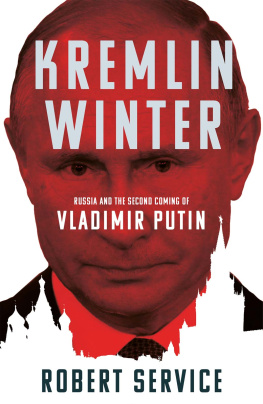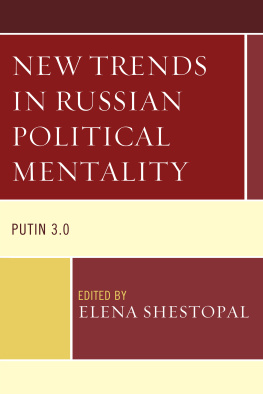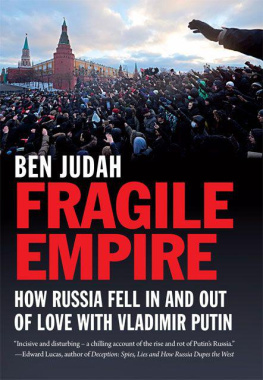Putin Redux
This book builds on the strengths of the previous volumes by the same author to provide the most detailed and nuanced account of the man, his politics and his profound influence on Russian politics, foreign policy and society. However, this is not a new edition of the earlier books but is an entirely new work. The focus now is on the dilemmas of power since 2008. There is a brief biographical sketch of Vladimir Putin and much analysis of his ideas and policies, but the book now focuses on the systemic contradictions that have created a blockage on modernisation and a stalemate in politics. Putins role as prime minister since 2008 and his political successes and failures, analysis of the implications of Putins third term as president and the 201112 electoral cycle and the ensuing crisis which led to thousands protesting on the streets are at the centre of analysis.
This work assesses the achievements and failing of Putins rule, but above all tries to make sense of contemporary developments. This is the definitive account of Putin and is essential reading for all scholars and students of Russian politics.
Richard Sakwa is Professor of Politics at the University of Kent, UK.
Putin Redux
Power and contradiction in contemporary Russia
Richard Sakwa
First published 2014
by Routledge
2 Park Square, Milton Park, Abingdon, Oxon OX14 4RN
and by Routledge
711 Third Avenue, New York, NY 10017
Routledge is an imprint of the Taylor & Francis Group, an informa business
2014 Richard Sakwa
The right of Richard Sakwa to be identified as author of this work has been asserted by him in accordance with the Copyright, Designs and Patent Act 1988.
All rights reserved. No part of this book may be reprinted or reproduced or utilised in any form or by any electronic, mechanical, or other means, now known or hereafter invented, including photocopying and recording, or in any information storage or retrieval system, without permission in writing from the publishers.
Trademark notice: Product or corporate names may be trademarks or registered trademarks, and are used only for identification and explanation without intent to infringe.
British Library Cataloguing in Publication Data
A catalogue record for this book is available from the British Library
Library of Congress Cataloging in Publication Data
Sakwa, Richard.
Putin redux : power and contradiction in contemporary Russia /
Richard Sakwa.
pages cm
Includes bibliographical references and index.
1. Russia (Federation)- -Politics and government- -21st century.
2. Post-communism- -Russia (Federation) 3. Putin, Vladimir Vladimirovich,
1952- I. Title.
DK510.763.S246 2014
947.0862- -dc23
2013044517
ISBN: 978-0-415-63093-1 (hbk)
ISBN: 978-0-415-63097-9 (pbk)
ISBN: 978-1-315-78103-7 (ebk)
Typeset in Times New Roman
by Integra Software Services Pvt. Ltd.
Contents
The transliteration system employed throughout this book is a modified version of British Standard, and is used in all cases except those where convention decrees otherwise. Thus the Russian letter becomes yu, becomes ya, and at the beginning of names e becomes ye (i.e. Yevgeny rather than Evgeny). For the sake of reader-friendliness the - or - at the end of words is rendered simply as -y (i.e. Dmitry rather than Dmitrii); similarly, in forenames s has been rendered x (i.e. Alexei rather than Aleksei). Diacritics representing the Russian hard and soft signs have been omitted in proper nouns.
Transliteration in bibliographical references will largely follow the more precise Library of Congress System (albeit with ya for and yu for ), and so the reader may at times notice variances between the spelling in the text and that found in the references.
All translations, unless otherwise indicated, are by the author.
This book builds on the two editions of my Putin: Russias Choice, first published by Routledge in 2004 and with a much revised version in 2008. However, this is not a new edition of the earlier book but is an entirely new work. The focus now is on the dilemmas of power since 2008. There is a brief biographical sketch of Vladimir Putin and much analysis of his ideas and policies, but the focus is on the systemic contradictions that have created a blockage on modernisation and a stalemate in politics. The interregnum of Dmitry Medvedevs presidency from 2008 offered the promise of controlled liberalisation from above, but this strategy was derailed by the brutal announcement in September 2011 that Putin planned to return for a third term. The popular protests that followed the flawed parliamentary elections in December 2011 illustrated the waning power of the Putin project and the increasingly stark contradiction with its practices, but he nevertheless won the hard-fought presidential election in March of the following year, and formally returned to the Kremlin in May. Thereafter the screws were tightened, accompanied by a deterioration of relations with the West. However, with the end of the tandem, clarity at least was restored about who was in charge. This work assesses the achievements and failings of Putins rule, but above all tries to make sense of contemporary developments.
I am once again most grateful to Craig Fowlie at Routledge for the support and encouragement he has given me in the preparation of this book. It is my pleasure to acknowledge the support of the British Academy for the Small Research Grant British (SG110035) Business Raiding in Contemporary Russia. I am also happy to thank the Norwegian Institute of International Affairs (NUPI) and the Norwegian Research Council (project number 209365/H30) for their support within the framework of the project Modernizing the Russian North: Politics and Practice. I much appreciate being an Honorary Senior Research Fellow at the Centre for Russian and East European Studies (CREES) at the University of Birmingham, which gives me access to Russian-language electronic materials. David Johnsons balanced and highly informative Russia List has been of immeasurable help in keeping up with facts and opinions on contemporary Russian matters. This work has greatly benefitted from conversations with my colleagues Philip Boobbyer and Adrian Pabst, as well as a host of fellow tillers of the Russian field too numerous to mention. I am, though, especially appreciative of discussions and substantive collaboration with Elena Chebankova, Piotr Dutkiewicz, Pavel Ivlev, Valentin Mikhailov, Andrew Monaghan, Vyacheslav Morozov, Nikolai Petrov, Cameron Ross, Sergei Yerofeev. My thanks for secretarial and other assistance go to the team in the department of Politics & International Relations, and in particular the School Administrative Manager Frances Pritchard, who together make the University of Kent such a congenial place in which to work. In trying to make sense of contemporary Russia for others, I have been forced to try to make sense of it for myself. As always, it has been like trying to hit a moving target, and the struggle for understanding continues. This is my modest contribution to what is undoubtedly a work in progress.
Richard Sakwa
Canterbury, October 2013
An era in Russian history is now associated with the name of Vladimir Putin. Appointed prime minister in August 1999, he was designated acting president by the aged and infirm Boris Yeltsin, Russias first president, just a few months later, on 31 December. Putin remains the dominant political figure in Russian politics to this day. However, neither he nor the country has stayed the same. Although there are profound continuities in Putins leadership style, at least four different stages in his rule can be identified, coinciding with the classic cycle of leadership.

